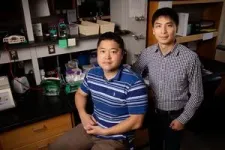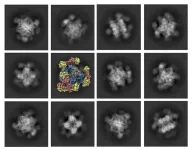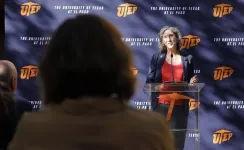(Press-News.org) The friction on a graphene surface can be dynamically tuned using external electric fields, according to researchers at the University of Illinois Urbana-Champaign led by Professor Rosa Espinosa-Marzal of the Department of Civil and Environmental Engineering. The work is detailed in the paper, “Dynamically tuning friction at the graphene interface using the field effect,” published September 19, 2023, in the journal Nature Communications.
Friction plays a key role in both natural and engineered systems, dictating the behavior of sliding contacts, affecting the wear of materials and influencing the flow of fluids across surfaces, among other effects. Friction can be controlled passively through the selection of design components, for example material and roughness. A more recent trend, however, has been to investigate systems whose frictional response can be dynamically tuned in situ, especially as micro- and nanoscale devices become more common. One of the more promising avenues to achieve friction control is with external electric fields that can modulate the properties of lubricants and material surfaces as well as the interactions between them.
“Novel approaches to the design of interacting surfaces are necessary to move past the state of the art,” write the researchers, “and 2D materials are a new and excellent choice based on their high mechanical strength and chemical and thermal stability.”
Graphene is the 2D form of carbon and is sometimes hailed as a “wonder material” because of its unique and superlative properties. Surfaces coated in graphene films generally exhibit very low friction, but the new results demonstrate that friction on graphene-coated surfaces can be “turned on” by exposing the surface to an electric field under the proper
conditions. The system can then be controlled in this higher friction state before being switched back to lower friction, all without applying large electrical biases between the surfaces in contact.
“The work will be impactful in reducing energy consumption in nano- and micro-electromechanical systems, in addition to allowing dynamic control of friction while mitigating the enhanced wear and corrosion of sliding surfaces when direct bias is applied,” Espinosa-Marzal said. The paper is available online at https://doi.org/10.1038/s41467-023-41375-7. Authors in addition to Espinosa-Marzal are Gus Greenwood, Jin Myung Kim, Shahriar Muhammad Nahid, Yeageun Lee, Amin Hajarian, SungWoo Nam.
###
END
Researchers dynamically tune friction in graphene
2023-09-28
ELSE PRESS RELEASES FROM THIS DATE:
Polyps as pixels: innovative technique maps biochemistry of coral reefs
2023-09-27
Using an innovative new approach to sampling corals, researchers at the University of Hawai‘i (UH) at Mānoa are now able to create maps of coral biochemistry that reveal with unprecedented detail the distribution of compounds that are integral to the healthy functioning of reefs. Their study was published today in Communications Biology.
“This work is a major step in understanding the coral holobiont [the coral animal and all of its associated microorganisms], which is critical for reef restoration and management,” said lead author Ty Roach, who conducted this study as a postdoctoral researcher at the Hawai‘i Institute of Marine Biology (HIMB) in the UH ...
Study shows how brain tumors make certain immune cells turn traitor
2023-09-27
September 27, 2023, NEW YORK – A Ludwig Cancer Research study has for the first time exhaustively analyzed immune cells known as neutrophils that reside in brain tumors, including gliomas, which develop in the brain itself, and cancers that spread there from the lung, breast and skin.
Led by Ludwig Lausanne’s Johanna Joyce and Roeltje Maas, an MD-PhD student in her laboratory, the study also details the key role neutrophils play in ensuring the survival of brain cancers and exposes the mechanisms by which the tumor microenvironment (TME) tweaks their biology to turn them into enablers of malignant growth. Its findings suggest new approaches ...
State politics, industry drive planetary health education for K-12 students in US
2023-09-27
CHAMPAIGN, Ill. — As much of the U.S. broils under record-setting temperatures, battles wildfires and is rocked by fierce storms, a new study suggests that the science learning standards for many public schools are not preparing young people to understand and respond to problems such as climate change that will dramatically impact their lives and those of millions of people around the globe.
Published in the Proceedings of the Royal Society B: Biological Science, the findings raise troubling questions about political bias shaping if and what the nation’s ...
UCLA-led team develops key improvement to Nobel Prize-winning technology
2023-09-27
The scientists who received the 2017 Nobel Prize in chemistry were honored for their development of a technique called cryo-electron microscopy, or cryo-EM. The technology was revolutionary because it enabled scientists to see the atomic structure of biological molecules in high resolution.
But cryo-EM still had a catch: It was only effective for imaging large molecules.
Now, UCLA biochemists, working with pharmaceutical industry scientists, have developed a solution that will make it possible for cryo-EM to acquire high-quality images of smaller protein molecules, too. The scientists engineered a 20 nanometer, cube-shaped ...
UTEP awarded $7 million to support Hispanic-serving institutions across the country
2023-09-27
EL PASO, Texas (Sept. 27, 2023) — The University of Texas at El Paso has been chosen to become a center of thought leadership for Hispanic Serving Institutions (HSIs) across the country, thanks to a new $7 million grant from the National Science Foundation (NSF).
The new grant, known as NODE (Network Opportunities for Developing Equitable and Effective Evaluation at HSIs), is a six-year investment that will position UTEP to provide the first full portrait of the effectiveness of all grants funded by the NSF HSI program. Anne-Marie Núñez, Ph.D., executive director of the Diana Natalicio Institute ...
JWST's first spectrum of a TRAPPIST-1 planet
2023-09-27
Image
In a solar system called TRAPPIST-1, 40 light years from the sun, seven Earth-sized planets revolve around a cold star.
Astronomers obtained new data from the James Webb Space Telescope (JWST) on TRAPPIST-1 b, the planet in the TRAPPIST-1 solar system closest to its star. These new observations offer insights into how its star can affect observations of exoplanets in the habitable zone of cool stars. In the habitable zone, liquid water can still exist on the orbiting planet's surface.
The ...
Wild Asian elephants display unique puzzle solving skills
2023-09-27
New York, September 27, 2023 – Individual innovation is considered one sign of intelligence within species, and elephants are among the animals that researchers have long taken an interest in because of their sophisticated approach to problem solving. A newly published study in the journal Animal Behaviour details findings from a six-month-long study documenting the abilities of individual wild Asian elephants to access food by solving puzzles that unlocked storage boxes.
“This is the first research study to show that individual wild elephants have different willingness and abilities to problem solve in ...
Mainstay malaria drug may be beginning to fail in the Horn of Africa
2023-09-27
In eastern Africa, malaria parasites have developed resistance to artemisinins, the backbone of current treatment regimens, a development that could dramatically worsen malaria’s impact if partner drugs fail in the future.
The finding from studies in Eritrea was reported Sept. 28 in the New England Journal of Medicine by a team of researchers led by Didier Ménard, PhD, of the Université de Strasbourg/Institut Pasteur in France and including Columbia University microbiologist David Fidock, PhD, the C.S. Hamish Young Professor of Microbiology & Immunology and professor of medical sciences in the Vagelos College of Physicians and Surgeons.
Treatment ...
Separating molecules requires lots of energy. This new, heat-resistant membrane could change that
2023-09-27
BUFFALO, N.Y. – Industry has long relied upon energy-intensive processes, such as distillation and crystallization, to separate molecules that ultimately serve as ingredients in medicine, chemicals and other products.
In recent decades, there has been a push to supplant these processes with membranes, which are potentially a lower-cost and eco-friendly alternative. Unfortunately, most membranes are made from polymers that degrade during use, making them impractical.
To solve this problem, a University at Buffalo-led research team ...
MSU works to make drinking water safer by fighting contaminants
2023-09-27
EAST LANSING, Mich. – Providing safe drinking water was a great public health achievement in the 20th century, yet problems persist. According to the Centers for Disease Control and Prevention, about 7.15 million waterborne illnesses occur in the United States annually resulting in 601,000 emergency room visits, 6,630 deaths and $3.33 billion in direct health care costs. Michigan State University, a world leader in water research, is working to make our drinking water safer.
MSU has been awarded a $2.1 million grant from the U.S. Environmental Protection ...






